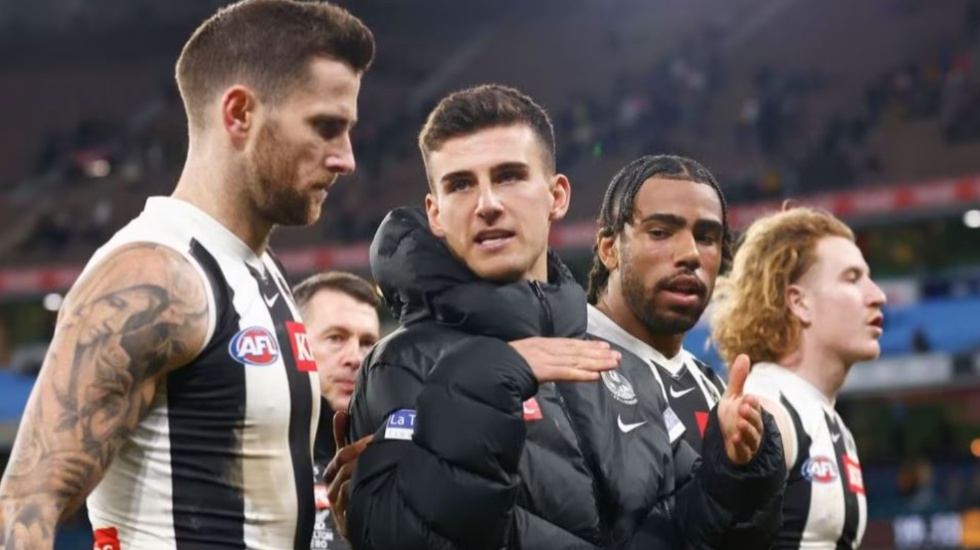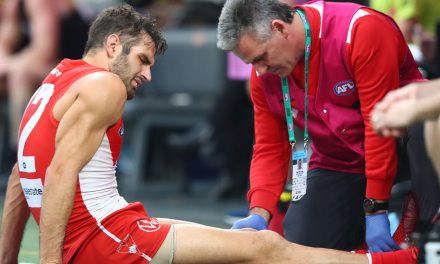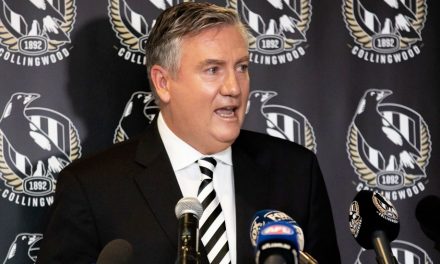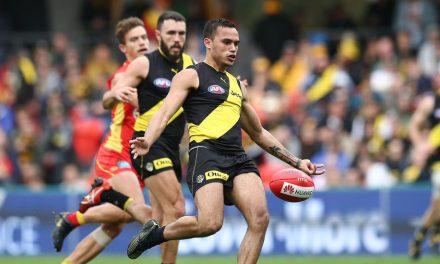An injured Nick Daicos walks off the MCG with Magpie teammates after Collingwood’s loss to Hawthorn. Photo: AFL MEDIA
One of the consequences of saturation coverage of a sport is that in order to be seen or heard, there’s a propensity to exaggerate the positive and to catastrophise the negative.
That’s what I started thinking about seconds after the siren heralded Hawthorn’s upset 32-point win over Collingwood on Saturday, as I pondered the likely headlines and “hot takes” we’d be reading and hearing in the aftermath.
It certainly was a bad day for the Pies, losing not just the game, but Brownlow Medal favourite Nick Daicos for at least six weeks and key defender Nathan Murphy for two to three weeks.
But does it justify the sort of season-ending, “can’t now win the premiership”-type hyperbole that was at the extreme end of the reactions post the result? Or even the “Magpies off the rails” slightly more subdued versions? Not in my book.
You’re obviously going to hear a lot more of the “why they’re in trouble” storylines over the next few days, if only because worst case scenarios make for more dramatic headlines and copy. But what about the case for Collingwood NOT panicking? OK, I’ll do it.
Some perspective here, please. With three games left to play, and the win-loss ledger 16-4, the Pies are still two games clear on top, with a top-two finish (meaning two MCG finals) all but assured provided they can win just one more of their remaining games (against Geelong, Brisbane and Essendon).
Now to the injuries. The underrated Murphy will be missed, sure, but Collingwood did manage to survive more than the first half of the season well enough without another defensive key in Jeremy Howe.
And Daicos? No one is pretending his loss isn’t costly. Is it insurmountable? Of course not. For starters, the six-week prognosis, given the pre-finals bye, and the further week’s rest earned by a qualifying final victor, means that Daicos may miss only Collingwood’s first final, so it’s not “game over” for him.
Without him, Collingwood is robbed of prolific ball-winning ability and smart ball use. But it’s not like the Pies don’t have other running players who win plenty of the footy, ranked No.7 before the weekend for disposals.
They’ve got plenty of other good users of the ball, too, Nick’s brother Josh for one, old stagers Scott Pendlebury and Steele Sidebottom, and Jordan De Goey, Isaac Quaynor, Jack Crisp, Pat Lipinski, just to name a few more.
There’s a tendency when a side on top all year has a downturn to not necessarily over-analyse, but effectively throw the baby out with the bathwater and make the inevitable declines in particular areas more consequential in isolation than they might when considered alongside the strengths which prevail.
PLEASE HELP US CONTINUE TO THRIVE BY BECOMING AN OFFICIAL FOOTYOLOGY PATRON. JUST CLICK THIS LINK.
For Collingwood right now, there’s a lot of focus on its declining numbers and ranking over recent weeks in the areas of clearances and contested ball.
True, the Magpies were smashed 18-3 out of the centre square by Hawthorn on Saturday, those three centre bounce wins the second-lowest tally recorded by a team this season. A couple of points, however.
Hawthorn, from its 18 centre bounce wins, scored only three goals. And the lowest centre bounce win tally this season? That was GWS in round 16 against Melbourne, a game the Giants actually ended up winning.
Collingwood has also declined sharply since round nine for contested ball differential, and it conceded 16 more inside 50 entries to Hawthorn on Saturday.
Again, though, a couple of points. The Pies are still comfortably in the top six ranked teams for the latter statistic. And perhaps contested ball and clearances aren’t quite the all-important metrics they used to be.
Champion Data’s “Premiership Standards” table tells us that only four of the last 10 premiership teams ranked in the top six for contested possession differential, and for clearance differential, both centre bounces and around the ground, just three teams ranked top six.
There’s six categories in which every single premier of the past 10 has ranked top six – points against, points against from turnovers, opposition points from the forward half, defensive to forward 50 transition, inside 50 differential and time in forward half differential.
Before the Hawthorn game, Collingwood was still ranked first, first, second, fifth, fifth and ninth respectively in those categories. Perhaps those continued strengths are even more important to their flag chances than those currently on the nose.
None of which suggests, by the way, that those ailing departments aren’t in need of addressing.
Nor that there’s not some big Collingwood names – like skipper Darcy Moore and Brownlow medallist Tom Mitchell, for example – who really need to lift a cog or two from their past couple of performances.
And up forward, the lack of an in-form key marking target is also being increasingly felt, with Mason Cox having been dropped and Brody Mihocek patently struggling at the moment.
Again, though, the most important statistic about Collingwood right now for me, is 29-6. That’s the number of wins and losses since the Pies last dropped consecutive games, in rounds eight and nine last year. And three of the six losses were by less than a straight kick or less.
We all know Collingwood sells. And of course “Collingwood crisis” is a sexier sell than “Collingwood challenged”.
But the Pies have been at or near the top of the ladder now for the best part of two seasons with good reason. And I’m not sure that’s about to change dramatically now even off the back of a couple of underwhelming performances and some injuries to key players.
This article first appeared at ESPN.











